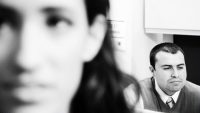A Psychologist Finally Explains Why You Hate Teamwork So Much
There’s no way around it: Every significant human accomplishment is the result of coordinated group behavior–people working together to achieve a common goal. Of course, that reality doesn’t change the fact that for lots of people, teamwork is like pulling teeth. Here’s why, and what to do about it.
How And When Teamwork Goes Awry
Psychologists know there’s a universal human need to belong to groups, but they also know that people aren’t always predisposed to working well with each other. Individual interests often sabotage team spirit. People’s competitive instincts end up finding targets in fellow team members rather than rival teams.
In fact, even when we want to collaborate, the wrong expertise, incompatible values, or an unusual style could make just about anybody a poor match for a given team. Talented leaders are good at picking the right people for the right task, and inspiring them to set aside their selfish agendas to focus on the group’s goals. Indeed, the ability to build high-performing teams is basically the essence of leadership.
But since good leadership is rare, you can’t always rely on your boss to guarantee your team’s performance. That’s why it’s helpful to know what type of role you’re best suited to play in your team–and answering that question requires understanding your personality profile. Who you are determines how you interact with people in a group setting in more ways than you might imagine.
So don’t just consider what a group’s goals are and then pick something that seems like a good match for your skills. Make sure you also check that the team you’re joining is a great fit for your personality. Three broad personality traits in particular can affect how well you work with your team, no matter what type of goal you’re trying to achieve together.
Ambition
Few personality characteristics are better predictors of team-related behaviors than ambition. On the bright side, ambitious people are naturally competitive, so they’re usually able to inject a winning mentality into their teams, aiming high and pushing for results. But ambition also has a darker side, which can drive people to obsess over their targets and accomplishments, neglecting team morale.
When things go badly, it’s often the most ambitious team members who blame others and get frustrated. And when they’re motivated by the pursuit of power, they’re the people most likely to challenge the leader’s authority and compete with other team members for status. (In a way, Freud was right to point out that if you’re in charge, your subordinates are always plotting to kill you.)
So the more ambitious you are, the harder you’ll find it to manage the tension between getting ahead and getting along. The best way to channel your personality into productive teamwork is to focus your competitive streak on a target outside your team. Your natural inclination to get ahead of others isn’t going away, but you can use it to motivate your whole team to beat the competition.
Creativity And Openness To Experience
Innovation is rarely the result of solo geniuses; it tends to be the product of teams. These teams tend to be managed by creative leaders, but there’s also a major personality trait that determines whether individuals fit in with these teams and how they contribute to those innovations–and that’s openness to experience.
Openness is associated with intellectual curiosity, aesthetic sensitivity, unconventionality, and thrill seeking, making it a major engine of team creativity. Much like ambition, there’s both a bright and a dark side to high levels of openness to experience. On the upside, it helps people challenge the status quo and conceive new ways of doing things. The more open you are, the more likely you are to embrace innovation and change. On the downside, too much openness will leave teams unfocused, struggling to get stuff done and prone to overcomplicating things.
A team full of open people will generate a lot of ideas and try lots of new things but have a hard time executing them. So someone with high openness to experience should stick with ideation and creative problem solving, leaving logistics to others.
Conscientiousness And Self-Control
The last main personality trait that makes a big difference in the success or failure of teamwork is conscientiousness. Conscientious people are reliable, dutiful, and diligent. They’re great planners and excel in teams that are well-structured and rule-bound. They’re also known for self-discipline and self-control, which helps them avoid distractions and perform well, even when they aren’t intrinsically motivated by the task.
Naturally, teams are more effective when they have a balance of these traits, and when people find roles that are compatible with their natural styles. In that sense, talent is personality in the right place.
Fast Company , Read Full Story
(65)














